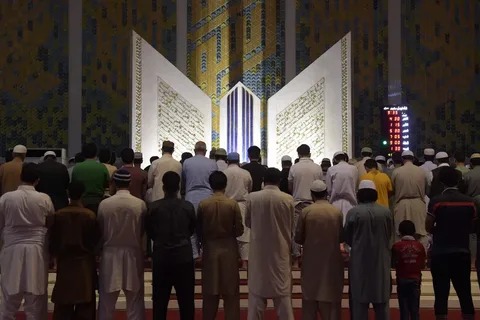Ever found yourself in awe of the mesmerizing nights during Ramadan when the mosque resonates with heart-touching recitations? That’s Taraweeh for you. Taraweeh is the special prayer performed by Muslims during the holy month of Ramadan, in this article on Arabian Tongue website we will explore Dua Taraweeh in English.
What is Taraweeh?
Significance of Taraweeh in Islam

The practice traces its roots back to the Prophet Muhammad (peace be upon him), who used to pray long hours during Ramadan nights. His followers, observing his devotion, began to join him in this nightly endeavor.
Taraweeh prayer isn’t just a ritual; it’s an avenue to spiritually rejuvenate, seeking closeness to the Almighty. Imagine, for a moment, charging your phone. The way your phone needs energy, your soul craves spiritual nourishment. Taraweeh does just that.
The Connection with Ramadan
How to Pray Taraweeh
Taraweeh prayer is performed after the ‘Isha (night) prayer during the holy month of Ramadan. Here’s a step-by-step guide on how to perform it:
Step 1: Prepare Yourself
- Perform Wudu (Ablution): Ensure you’re in a state of purity by performing ablution.
- Set the Intention (Niyyah): Make a sincere intention in your heart to perform Taraweeh prayer for the sake of Allah.
Step 2: Start with ‘Isha Prayer
Begin by performing the ‘Isha prayer, which consists of four Rak’ahs (units).
Step 3: Commencing Taraweeh
- First Two Rak’ahs:
- Stand and recite Surah Al-Fatiha followed by any other Surah.
- Complete the usual steps of a regular prayer (bowing, prostration, and sitting).
- After two Rak’ahs, conclude with Tasleem (saying “Assalamu Alaikum wa Rahmatullah” to both sides).
- You can now recite a dua to recite after Taraweeh or dua in between Taraweeh prayer.
- Repeat for Each Pair:
- Continue performing Taraweeh in pairs of Rak’ahs, reciting a dua for Taraweeh every 4 Rak’ahs if you wish, until you complete your desired number.
Step 4: The Number of Rak’ahs
- Traditionally, Taraweeh consists of 20 Rak’ahs, but some perform 8 Rak’ahs.
- It is performed in sets of two with brief pauses between every two or four Rak’ahs.
Step 5: Witr Prayer
After completing Taraweeh, conclude with the Witr prayer:
- Perform one, three, or more Rak’ahs.
- Recite the Qunoot dua in the final Rak’ah, asking for guidance, protection, and blessings.
can women pray taraweeh at home
Yes, women can pray Taraweeh at home. In fact, it is entirely permissible and encouraged for women to perform Taraweeh prayer either in the mosque or in the comfort of their homes, depending on their preference and circumstances. Praying at home offers flexibility, especially for those who may find it challenging to attend congregational prayers due to family responsibilities or other commitments.
Women can pray Taraweeh individually or in a small congregation with family members. They can follow the same structure as in the mosque, including reciting duas between Taraweeh and after completing the prayer. Whether prayed in the mosque or at home, the reward for Taraweeh remains significant, as it is a means of spiritual growth, connection with Allah, and seeking forgiveness during Ramadan.
Dua in Between Taraweeh Prayer
The breaks between sets of Rak’ahs provide the perfect opportunity to connect deeply with Allah. These moments allow for the recitation of dua for Taraweeh after 2 Rak’ahs and dua for Taraweeh every 4 Rak’ahs, which enhances the spiritual experience.
- Dua for Taraweeh after 2 Rak’ahs: Personal prayers seeking forgiveness and blessings.
- Dua to recite between Taraweeh: Recite heartfelt supplications asking Allah for mercy.
- Dua to read during Taraweeh: Any Quranic verse or supplication that resonates with you.
The Importance of Dua taraweeh prayer
During Taraweeh prayers, Muslims resort to praying to their Lord in various forms:
- Connecting with Allah: The breaks in Taraweeh are like spiritual pit stops. They’re your chance to converse with Allah, laying bare your heart, hopes, and fears.
- Seeking Forgiveness: Ramadan is the month of forgiveness. Through these duas, one actively seeks Allah’s mercy, hoping to be cleansed of past mistakes.
Dua Taraweeh in English

By including these duas in your prayer, whether it’s a dua to recite between Taraweeh or a dua after completing Taraweeh, you enrich your spiritual connection and elevate your Ramadan experience.
Dua to Recite During Taraweeh
One common dua to read during Taraweeh prayer, particularly in the Witr prayer, is:
اللهم اهدني فيمن هديت، وعافني فيمن عافيت، وتولني فيمن توليت…
This supplication emphasizes seeking guidance, protection, and blessings.
Dua to Recite After Taraweeh
After completing the Taraweeh prayer, Muslims may recite personal duas, asking for forgiveness, mercy, and blessings for themselves and the entire Muslim Ummah.
Dua After Completing Taraweeh
On certain nights, especially during the last ten nights, if the Imam completes the recitation of the Qur’an, a special Dua Khatm-ul-Qur’an is performed. This heartfelt dua seeks Allah’s blessings for the congregation and the global Muslim community.
2. Dua after completing the Qur’an: On some nights, especially in the last ten nights of Ramadan, if the Imam completes the recitation of the Qur’an during Taraweeh, a special supplication known as “Dua Khatm-ul-Qur’an” is recited. This supplication is lengthy and seeks God’s mercy, forgiveness, and blessings for the entire congregation and all believers.
Tips for a Meaningful Taraweeh Experience
- Intention is Key: Approach Taraweeh with a sincere heart, seeking Allah’s pleasure.
- Understand the Recitation: Grasp the meanings of the verses being recited for a deeper connection.
- Stay Consistent: Aim to attend Taraweeh every night of Ramadan. Consistency breeds spiritual growth.
HOW Arabian tongue shapes your journey of LEARNing QURAN and arabic?
At Arabian Tongue, we empower you with the tools that allow for reflecting on the meanings of the Quran and sensing the greatness of the Creator. We incorporate unique teaching methods in our courses listed below:
- Learn Quran Online
- Learn Arabic Online
- Learn Tagweed Online
- Arabic grammar course online for beginners
- Quran Ijazah Course for Kids
FAQs
How many Rak’ahs are there in Taraweeh?
Typically, there are 20 Rak’ahs, but some perform 8 based on different traditions.
Is Taraweeh compulsory?
No, it's a Sunnah, highly recommended but not obligatory.
Can I pray Taraweeh at home?
Yes, while it's preferable to pray in congregation at a mosque, one can pray Taraweeh at home.
Can I make my own personal duas during Taraweeh?
Absolutely! The breaks in Taraweeh are perfect moments to make personal supplications.
What if I can't stand for long durations during Taraweeh?
Allah understands your intentions and capabilities. You can sit and pray if standing becomes difficult.
Conclusion
Taraweeh, in its essence, is a beautiful journey during the blessed nights of Ramadan. The accompanying duas act as whispers from the heart, solidifying the bond between the worshipper and the Divine. As you navigate through Ramadan, let Taraweeh be your sanctuary, and its duas be your compass.


